All photos by Conor LambThe first thing I noticed about Osoré Ale Oyagha was his gangly arms. They hang so far past his waistline, I thought. Maybe this guy should be a wide receiver instead of a fashion designer. I caught him digging through a dusty record bin in the back of Ale et Ange, the Lower East Side boutique that he started in the fall of 2006 alongside his friend and fellow designer Eloise Ange Simonet. Osoré was the only one in the store, which is the size of a suburban kitchen and has that same kind of lived-in feel, with big windows that let in natural light. The narrow, almost claustrophobic space is peppered with expertly crafted versions of traditional men’s clothing items like dress shirts, trousers, and baseball caps—but tweaked with global-minded flourishes such as the vibrantly colorful African Ankara fabrics they use for their now-signature hats. These are the pieces that have brought them attention from sites all across the internet like the Fader and Complex, and scored them nods in the printed pages of Vogue.
Advertisement
Osoré barely gave me a nod as I browsed the dress shirts and trousers— he was too busy searching for another Broadcast record to plop on the store’s turntable before dead air set in. When the question of the next song to be played was finally settled, he spoke up.
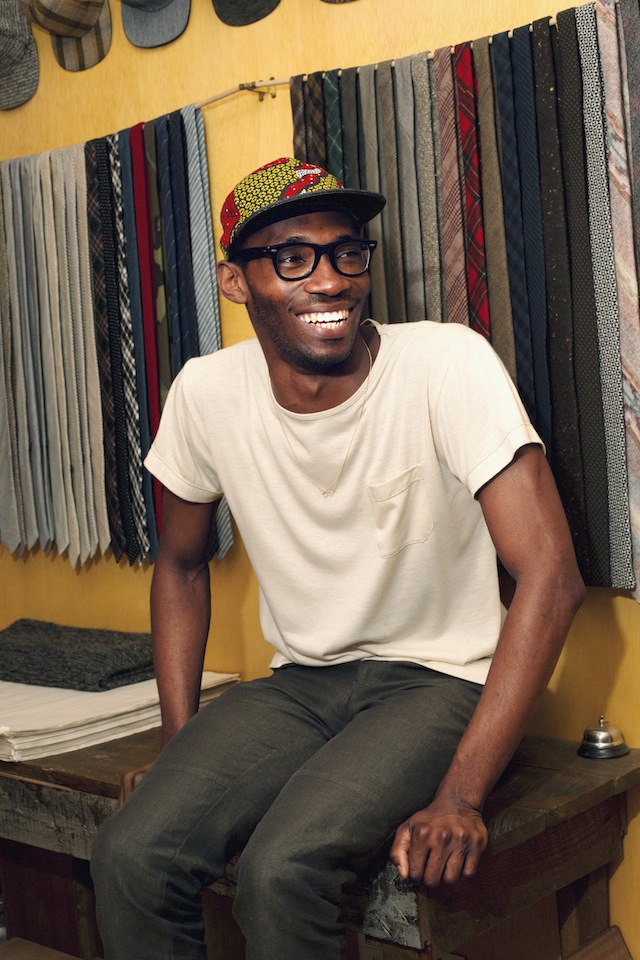
“What’s up man?” he greeted me with a nasally accent I couldn’t place. I hadn’t called ahead, so he had no idea I was a writer for VICE scoping out the store to see if it lived up to its hype. Not that he would care. The shop isn’t one of those space-age boutiques with wi-fi or iPod docks and it’s clear Osoré’s not the kind of guy who sits up late reading blogs or fashion forums. He’s consumed by vintage fabrics and collecting old, obscure records to care what the internet peanut gallery thinks.The insular aura of Ale et Ange is one of the things that leaves such a lasting impression on anyone that visits the store. But it's kind of unsustainable. You can't be quaint when fashion mavens like the Street Etiquette crew, Mos Def (now known as Yasiin Bey), and Pusha T are devotees of your shit. And their success is not without its pitfalls. They complain of practically getting stalked when they are shoping for fabrics and they're adamant that their distinct aesthetic, personified in their allover print caps, is being aped by bigger fashion brands for big bucks.It’s not like the ascent of Ale et Ange is some kind of accident driven by the whims of fashion bloggers. Both Osoré and Eloise were groomed for this business from an early age. Eloise, the gorgeous caramel skinned better half of the design duo who speaks in a sweet and calm drawl and sports a frizzy lioness mane, was raised in both Jamaica and New York. Her Rasta father naturally had an inclination towards colorful gear in red, gold, and green—an influence you can clearly see in Ale et Ange’s collections—and her fashion designer mother ran a garment factory out of her front porch. Eloise’s mother taught her how to use a sewing machine and introduced her to Betsey Johnson, the legendary designer and family friend who had a profound impact on Eloise’s ideas about the things we wear.
Advertisement
“I met Betsey when I was 11,” Eloise told me. “What an amazing lady. I got to spend a good amount of time with her, and when I lived in the States during high school she used to invite me to all of her fashion shows. She always gave me the coolest samples too. She was just like wow—a ‘wow’ lady.”
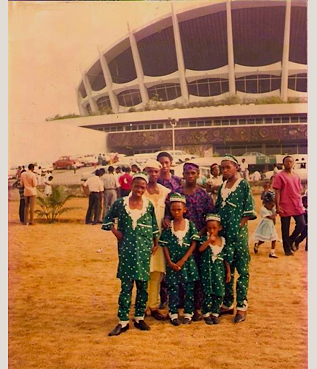
Archival photo of Osoré as a child with his family.Like Eloise, Osoré’s mother worked in fashion while his father was a diplomat whose sense of style influenced Osoré from a young age. “My dad wore a lot of YSL,” he said. “He had shoes, ties, everything. We used to call him James Bond. I’d cut off all of his labels and sew them into all of my shirts.” Like 007, Osoré’s dad’s work took him to England, Tokyo, and everywhere in between. But it was in Osoré’s native country of Nigeria that he first started to dabble in the family business by trekking across the border to Benin to buy vintage garments, swapping the tags out, and selling them back in Nigeria as “clothes from England.” Eventually, Osoré figured it’d be easier to make his own threads. So he started taking the vintage clothes to his mom’s factory so the ladies there could remake the garments.Osoré’s fairly illegal counterfeit endeavors and Eloise’s schooling from her mother and Betsey Johnson was perfect training for launching the brand they would ultimately build together, which is good because both of them skirted past the whole “go to fashion school and get a degree” thing.
Advertisement
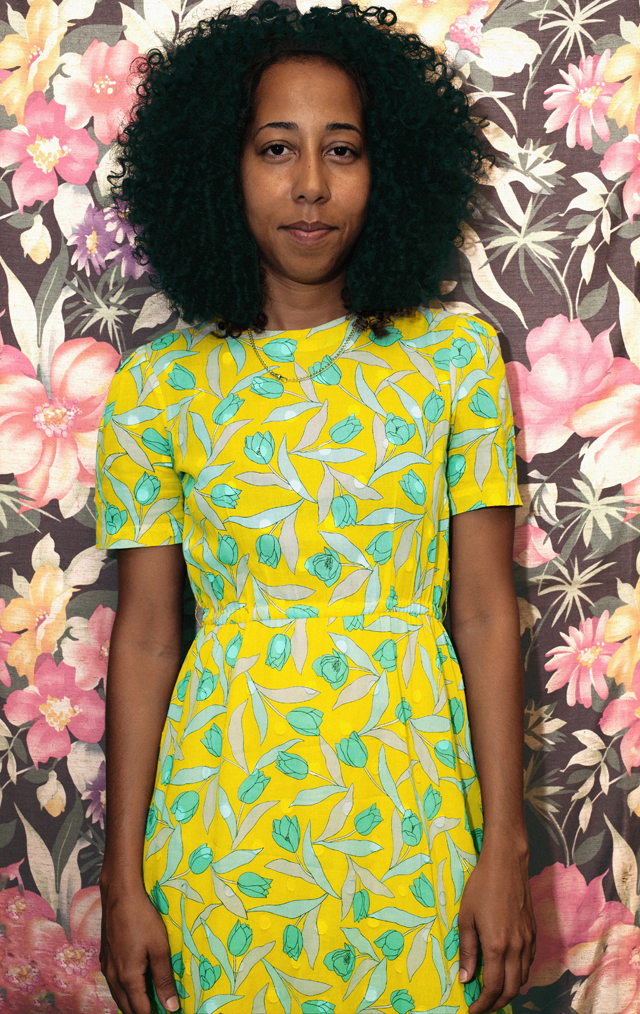
“I didn’t really like school when I was in it,” Eloise said. “So I didn’t feel like going back for more. There were all these things I wanted to do and I didn’t want to study them first. So, I moved to New York and had all sorts of crazy jobs.” Before linking up with Osoré, Eliose moonlighted as a massage therapist, worked as a teacher at the Harlem YMCA—according to her, kids are cooler than adults—and served as a nanny for model Audrey Marnay.While Eloise was working odd jobs, Osoré was playing counterfeit again, this time with his parents. “My dad was the first one in his family to go to university and put himself through school, which is a big deal. And it is HUGE in Nigeria to talk about how your kid is studying to be a doctor or whatever. But I didn’t want to go to college, so I faked it.”In order to get his visa to come to the US from Tokyo, where his family was living at the time, Osoré enrolled in the Fashion Institute of Technology and his parents paid for three years of schooling. “I went for like one day and was like, ‘Naaahhh.’ So I started working at places like Helmut Lang. That’s basically why I came here—to go to school but not to.”It was in this in-between phase of their lives that Osoré and Eloise crashed into each other. Eloise understandably caught Osoré’s eye at a party and the following day he cold-called her after getting the digits from a mutual friend for a pad-Thai dinner date in the East Village. The burgeoning relationship didn’t last, however, and Eloise doesn’t like talking about.
Advertisement
“I don’t even remember it,” Eloise told me when I touched on the question of their relationship. “I’ve kind of blocked it out. Do you even have to mention it? I don’t want to freak out all the future guys I might meet. Trying to find a husband is hard when you work with your ex.”
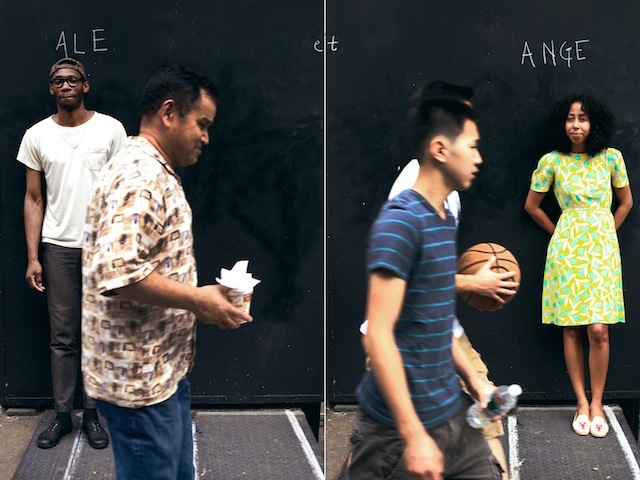
Honestly, it’s kind of hard to imagine the two of them being romantically involved. When I finally got to interview the duo in person, a few weeks after my first trip to the store, it surprised me how much they came off like bickering siblings rather than ex-lovers. If anything, it seems like Osoré just likes talking about their past relationship because it gets on Eloise’s nerves, like the little brother who can’t help trying to put a bug in his sister’s hair.Ale et Ange isn’t the first creative endeavor undertaken by the duo. Back in 2005, they owned a record shop in Atlanta called Integrated Science that also sold art and one-of-a-kind hand-painted sneakers. This was the first space where Eloise got to express herself through interior design, and she painted the entire floor in camouflage and decorated the space with the duo’s handmade furniture. Unfortunately, all images of the store were saved on a now-crashed computer, so there’s no way to see what it looked like. However, its legacy lives on through Ale et Ange, whose launch was funded largely by the defunct store’s liquidated assets.“When we came to Atlanta we had like 1,000 records,” Osoré said. “When we moved back to New York, we had close to 20,000. I spent a year selling them on eBay, and it was during that time that I realized I couldn’t go back to working for someone else.”
Advertisement
They launched the first Ale et Ange shop in 2009 in a below-ground-level space on Orchard Street, and the store immediately got attention for its classic clothes for both men and women (they’ve since stopped making womenswear, but plan to start again soon) that boasted luxurious fabrics and patterns with handmade quality. Eloise’s flair for decoration transformed the space from a scuzzy cellar into a cozy apartment with a kitchenette and a French bathtub, which was attention-grabbing but didn’t result in the most conducive environment for retail.“People would just be kind of be awestruck when they walked in and would just sit on the floor and hang out,” Eloise said. “Like, ‘Um, yeah dude, this is not your house… it’s a store.”So they retooled and moved the shop to its current location on Rivington Street, where there’s no room for you to sit and chill out. Button-down dress shirts and all-over print tees hang from exposed metal and wooden racks, while more sizes are sharply folded above your head and at your feet. Twelve flavors of Ankara hats hang in two rows across the wall—the top tier are the most expensive with soft leather brims, while the bottom tier are cheaper but more fun with cheetah prints and patterns on their undersides that only the wearer can see.
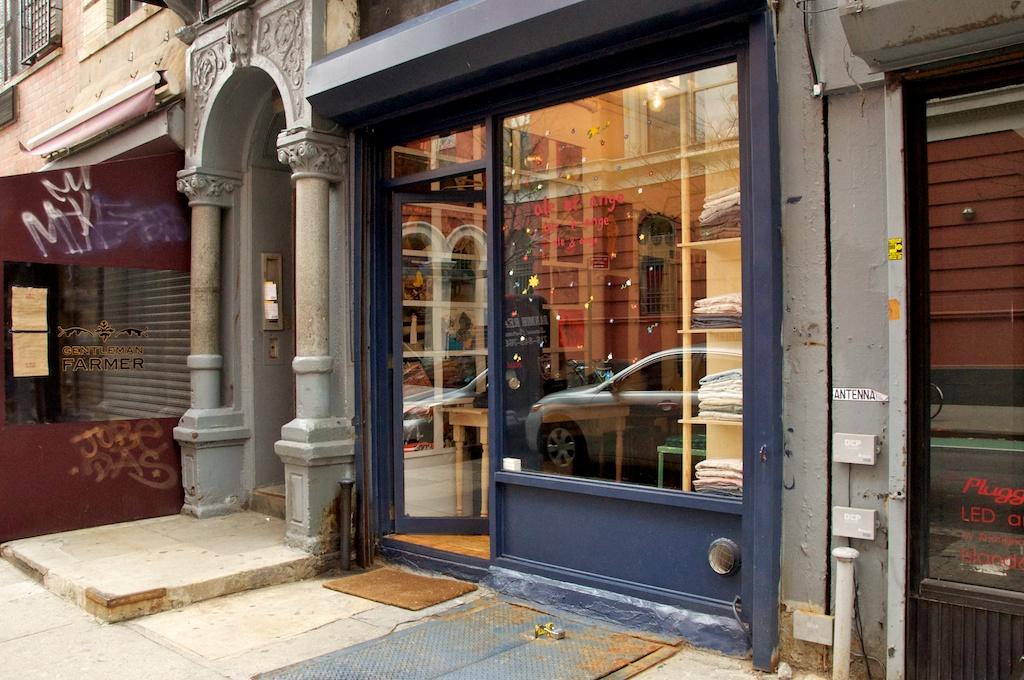
Photo via Shopikon.comSince moving to Rivington, the duo has experienced a great deal of success from selling out collections to seeing the first launch of their new web store. But they’ve also had to deal with their fair share of SMH-type shit like walk-ins who are struck with sheer disbelief that two young black people are capable of putting together Ale et Ange’s dope garments, or stylists who try to hustle them for 50 percent of their business’s profit for putting one of their pieces on a celebrity. “Do stylists get 50 percent of Balenciaga shoe sales when they put them on their client? Why would they expect that from us?” Eloise exclaimed to me. And then there are the household name fashion designers who come into the store solely to bite their style. “They come in and flip our clothes inside out,” Osoré said. “They're just studying everything. They don't even introduce themselves! I’ve even had designers come in here and ask me if they could take pictures!”
Advertisement
But despite the bullshit they’ve experienced, they refuse to allow themselves and their work to be pigeonholed. “It’s funny because we don’t consider ourselves ‘black designers.’ I hate that. We are designers who happen to be black. We are making clothes for everyone,” Osore said.And that’s a good thing because I think a lot of white dudes would look way better in one of Ale et Ange’s African Ankara caps than a fitted Pro Model or one of those trucker things some losers are still wearing.You can purchase gear from Ale et Ange’s fall collection right now at their newly launched webstore or visit them at the brick-and-mortar location in the Lower East Side. Osoré and Eloise are the boutique’s sole sale’s assistants, so if you go in make sure to say hi and see if Osoré will let you pick the next record to play in his turntable… I highly doubt it.
